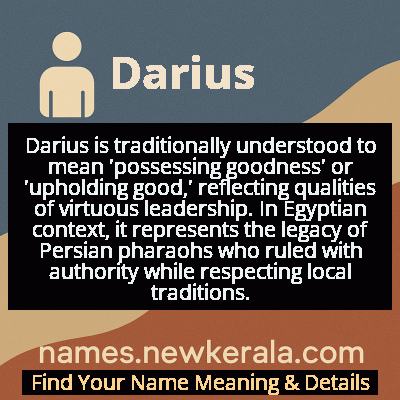Darius Name Meaning & Details
Origin, Popularity, Numerology Analysis & Name Meaning of Darius
Discover the origin, meaning, and cultural significance of the name DARIUS. Delve into its historical roots and explore the lasting impact it has had on communities and traditions.
Name
Darius
Gender
Male
Origin
Egyptian
Lucky Number
9
Meaning of the Name - Darius
Darius is traditionally understood to mean 'possessing goodness' or 'upholding good,' reflecting qualities of virtuous leadership. In Egyptian context, it represents the legacy of Persian pharaohs who ruled with authority while respecting local traditions.
Darius - Complete Numerology Analysis
Your Numerology Number
Based on Pythagorean Numerology System
Ruling Planet
Mars
Positive Nature
Generous, passionate, energetic, and humanitarian.
Negative Traits
Impulsive, impatient, moody, and can be overly emotional.
Lucky Colours
Red, maroon, scarlet.
Lucky Days
Tuesday.
Lucky Stones
Red coral, garnet.
Harmony Numbers
1, 2, 3, 6.
Best Suited Professions
Military, sports, philanthropy, leadership roles.
What People Like About You
Courage, energy, leadership, generosity.
Famous People Named Darius
Darius I
Persian Emperor
Expanded the Achaemenid Empire to its greatest extent and organized its administrative structure
Darius II
Persian Emperor
Ruled the Persian Empire during the Peloponnesian War and maintained imperial stability
Darius III
Persian Emperor
Last king of the Achaemenid Empire, fought against Alexander the Great
Darius Milhaud
French Composer
Influential composer and teacher, member of Les Six, known for incorporating jazz and Brazilian elements
Name Variations & International Equivalents
Click on blue names to explore their detailed meanings. Gray names with will be available soon.
Cultural & Historical Significance
In Egyptian context, though Persian in origin, Darius was adopted by Persian pharaohs who ruled Egypt, particularly Darius I who completed the canal connecting the Nile to the Red Sea and was recognized in Egyptian tradition as a legitimate pharaoh, building temples and respecting local customs. The name represents a bridge between Persian imperial authority and Egyptian pharaonic tradition, symbolizing the ability to rule diverse cultures while maintaining stability and prosperity. This dual heritage makes Darius a name that transcends single cultural boundaries and represents multicultural leadership.
Extended Personality Analysis
Individuals named Darius are often perceived as possessing natural leadership qualities, strategic thinking, and a commanding presence. They tend to be ambitious, organized, and capable of managing complex situations with grace and authority. The historical association with Persian kings lends an air of regality and administrative competence to the name, suggesting someone who is both visionary and practical in their approach to challenges. Darius is typically seen as confident yet measured, with a strong sense of responsibility and tradition.
Beyond the leadership qualities, those named Darius often exhibit diplomatic skills and cultural awareness, able to navigate diverse social situations while maintaining their core principles. The name suggests a person who values structure and achievement but also possesses the wisdom to know when to be flexible and adaptive to changing circumstances. There's often an artistic or creative dimension as well, reflecting the name's association with cultural patronage and architectural achievement in its historical context. Darius carries expectations of integrity, reliability, and the ability to inspire confidence in others through both words and actions.
Modern Usage & Popularity
Darius maintains steady popularity as a masculine given name across various cultures, particularly in Persian communities and Western countries. In the United States, it has consistently ranked within the top 500-800 names for boys over recent decades, experiencing periodic surges in popularity. The name is favored by parents seeking a strong, historical name with multicultural appeal that isn't overly common. It's particularly popular among African-American families, where it's appreciated for its regal connotations and distinctive sound. In Europe, variations like Dario and Dariusz are more common, while the English form Darius is widely recognized and used in professional and academic circles. The name continues to be chosen by parents who want a name that sounds both classic and distinctive, with historical weight but contemporary usability.
Symbolic & Spiritual Meanings
Symbolically, Darius represents kingship, empire-building, and administrative excellence. The name evokes images of grand palaces, ancient empires, and strategic governance. It carries connotations of cultural bridge-building, reflecting the historical Darius's ability to rule diverse peoples while respecting their traditions. The name symbolizes the balance between strength and wisdom, military prowess and diplomatic skill. In metaphorical terms, Darius suggests someone who can build lasting structures—whether physical, organizational, or relational—and maintain them through thoughtful leadership. It represents the ideal of enlightened rulership where power is exercised with responsibility and vision for the greater good, making it a name that embodies both ambition and ethical governance.

